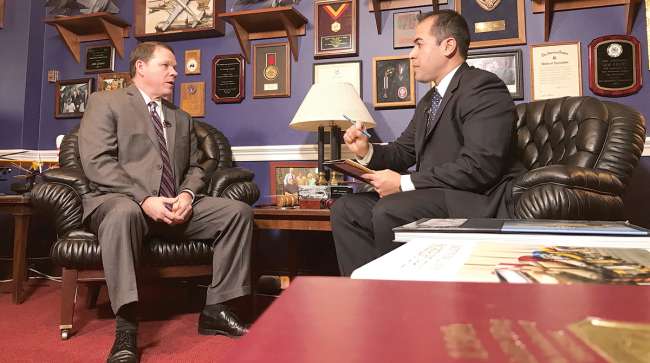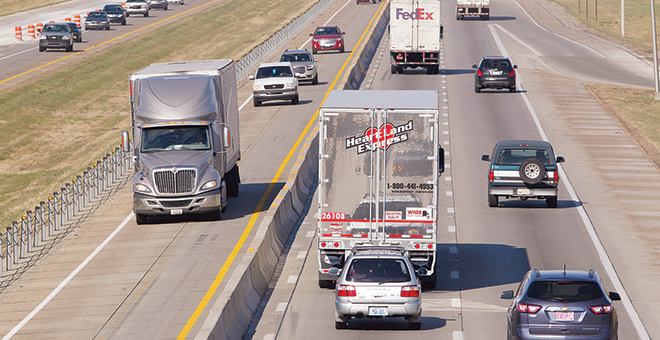Senior Reporter
House Highways Leader Sam Graves Optimistic About Trump’s Infrastructure Plan Passage

WASHINGTON — Missouri Republican Rep. Sam Graves, among the leading candidates to succeed outgoing Transportation and Infrastructure Chairman Bill Shuster next year, said he is optimistic about the chances of advancing a massive infrastructure plan this year.
But first, Republican leaders are awaiting the details of President Donald Trump’s infrastructure plan, which Graves expects to see after the president’s State of the Union address Jan. 30.
LIVEONWEB's 2018 GOVERNMENT OUTLOOK: Coming Jan. 17
“We want to see it happen this year, sooner rather than later,” Graves told Transport Topics in his Capitol Hill office on Jan. 10. He is chairman of the Highways and Transit Subcommittee. “We’re going to do everything we can to move it out of the House. I’m optimistic.”
A top priority of mine in 2018 is hammering out a comprehensive infrastructure package. As Chairman of Highways & Transit, I look forward to working w/ @POTUS & @Transport to improve the infrastructure of today & build for the infrastructure of tomorrow→ https://t.co/N3VP8klnjZ\ pic.twitter.com/t5RWBfAtYl — Rep. Sam Graves (@RepSamGraves) January 11, 2018
Graves’ confidence is shared by a few lawmakers and White House officials. Most congressional observers argue the midterm elections in November will discourage lawmakers from taking up high-profile votes after the summer recess.
The Trump White House’s constant scheduling change of its highly anticipated $1 trillion, 10-year plan could hinder its passage this year. The spring agenda in Congress includes high-level budget negotiations and a controversial immigration debate. It is unclear when Hill leaders will have time to debate infrastructure.
Graves’ counterparts in the Senate, who recently met with senior White House officials, have expressed concerns about timing as well as the expectation the plan would rely heavily on private-sector funds to pay for projects.
If Trump is to make good on his infrastructure plan, which was supposed to be unveiled during his first 100 days in office, Graves will play a central part in legislative negotiations. His panel oversees highway policy.
Thus far, Graves said lawmakers have not seen a full plan, which he expects would be “very broad.”
The administration released a few details last year, calling for $200 billion in federal funds that would leverage $800 billion in private sector investments. Rural projects would receive $25 billion. States would be encouraged to increase funding for projects, and tolling would spread along busy corridors.
“Obviously, the administration would like to see a trillion dollars worth of investment. We’ll see if we can get there. That’s a pretty tough lift,” Graves said. “It is going to be a massive infrastructure bill, though.”
He added, “We’ll move fairly quickly once we get their guidelines and ideas.”

A vehicles miles-traveled fee, which would entail monitoring vehicles and billing drivers after a certain period, would be a funding alternative Graves said he could support. (John Sommers II for Transport Topics)
With the Highway Trust Fund’s looming insolvency, figuring out a long-term source of funding for infrastructure will take center stage when congressional negotiations kickoff. A major point of contention will be whether to raise fuel taxes, which leaders from both parties have not considered doing since former President Bill Clinton’s first term. The trust fund relies on revenue from the 18.4 cents-per-gallon gas tax and 24.4 cents-per-gallon diesel tax. Most infrastructure stakeholders, such as the trucking and construction industries, support raising fuel taxes.
For Graves, however, the fuel tax represents a regressive source of funding, and a vote on raising it in Congress would be “very hard to pass.” Improvements in fuel economy and shifting driving habits over the years contributed to the drop in revenue for the trust fund, he argues.
“We obviously have more and more vehicles on the road that simply don’t pay any fuel tax. Or we have more efficiency, so they’re paying less in fuel tax,” Graves explained. “Ultimately, we have to change over to something else because as time goes on, fewer and fewer dollars are going to come in as a result of those efficiencies or vehicles just not paying.”
A vehicles miles-traveled fee, which would entail monitoring vehicles and billing drivers after a certain period, would be a funding alternative Graves said he could support.
Trump’s infrastructure plan also is expected to propose changes in the culture across federal agencies that, according to Graves, would mean enhancing the implementation of funding for big-ticket infrastructure projects.
“We found that a lot of the programs that were passed in the past highway bills, it’s very hard to qualify, very hard to meet the criteria to be able to do a lot of these projects. We want to see that streamlined,” he said, citing the Transportation Infrastructure Finance and Innovation Act as an example.
Other programs likely to be updated under the plan include the Transportation Investment Generating Economic Recovery (TIGER) grants, and the Infrastructure for Rebuilding America grants.
Throughout the year, Graves will call on colleagues in leadership to support his candidacy for the chairmanship of the Transportation committee next year. His experience in helping to advance three major highway bills, his current chairmanship of the Highways and Transit panel and a previous stint as chairman of the Small Business Committee qualify him for the job, he said.
Graves also has sought to become one of the freight industry’s most reliable allies. His subcommittee held high-profile hearings, as recently as December, with trucking executives at which they voiced concerns about highway congestion.


